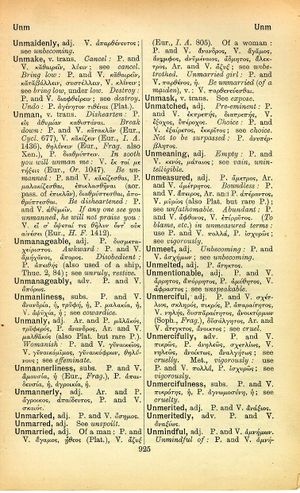unman: Difference between revisions
νεκρὸν ἐάν ποτ' ἴδηις καὶ μνήματα κωφὰ παράγηις κοινὸν ἔσοπτρον ὁρᾶις· ὁ θανὼν οὕτως προσεδόκα → whenever you see a body dead, or pass by silent tombs, you look into the mirror of all men's destiny: the dead man expected nothing else | if you ever see a corpse or walk by quiet graves, that's when you look into the mirror we all share: the dead expected this
(CSV5) |
m (Text replacement - "<b class="b2">H. F.</b>" to "''H. F.''") |
||
| Line 12: | Line 12: | ||
<b class="b2">Be disheartened</b>: P. and V. ἀθυμεῖν. | <b class="b2">Be disheartened</b>: P. and V. ἀθυμεῖν. | ||
<b class="b2">If any one see you unmanned, he will not praise you</b>: V. εἴ σʼ ὄψεταί τις θῆλυν ὄντʼ οὐκ αἰνέσει (Eur., | <b class="b2">If any one see you unmanned, he will not praise you</b>: V. εἴ σʼ ὄψεταί τις θῆλυν ὄντʼ οὐκ αἰνέσει (Eur., ''H. F.'' 1412). | ||
}} | }} | ||
Revision as of 16:24, 22 July 2017
English > Greek (Woodhouse)
v. trans.
Dishearten: P. εἰς ἀθυμίαν καθιστάναι.
Break down: P. and V. κατακλᾶν (Eur., Cycl. 677), V. κακίζειν (Eur., I. A. 1436), θηλύνειν (Eur., Frag. also Xen.), P. διαθρύπτειν.
In sooth you will unman me: V. ἔκ τοί με τήξεις (Eur., Or. 1047).
Be unmanned: P. and V. κακίζεσθαι, P. μαλακίζεσθαι, ἐπικλασθῆναι (aor. pass. of ἐπικλᾶν), διαθρύπτεσθαι, ἀποθρύπτεσθαι.
Be disheartened: P. and V. ἀθυμεῖν.
If any one see you unmanned, he will not praise you: V. εἴ σʼ ὄψεταί τις θῆλυν ὄντʼ οὐκ αἰνέσει (Eur., H. F. 1412).

